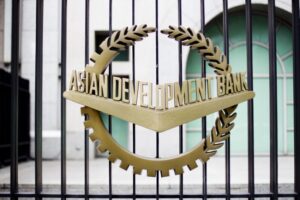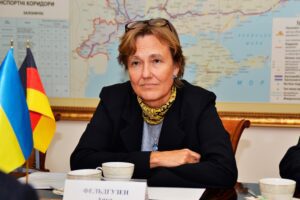
The Asian Development Bank has approved two loans to Uzbekistan totaling $400 million to implement large-scale reforms in the energy sector aimed at improving its efficiency and competitiveness, as well as developing the country’s financial markets.
ADB’s Director General for Central and West Asia, Evgeny Zhukov, said that the reforms supported by these programs will help create an enabling environment for regulators and companies to play their part in stimulating development by creating reliable domestic financial markets and meeting energy needs while fighting climate change.
ADB will provide $300 million to reform Uzbekistan’s energy sector, including creating a more effective governance structure, improving legislation, and attracting private investment.
To develop Uzbekistan’s financial market, ADB will provide $100 million to implement regulatory and institutional reforms aimed at improving market conditions to optimize financial transactions and services, and to increase supply and demand side measures to grow capital markets.
Uzbekistan joined ADB in 1995, and since then, the bank has provided $12.5 billion in loans, grants, and technical assistance to the country.

Ukrainian President Volodymyr Zelensky has signed a law to improve state regulation in the fishing industry, which launches large-scale changes in this area, the government portal said on Monday.
“The bill was developed for maximum consideration of the wishes of all market players, as well as for harmonization of Ukrainian legislation with the regulatory framework of EU countries,” explained the acting head of the State Fish Agency Igor Klimenok, whose words are quoted in the message on the website of the Cabinet of Ministers.
At the same time, he expressed confidence that already in 2023, the industry will feel the changes.
According to the report, the Law ¹ 7616 “On Amendments to Certain Legislative Acts of Ukraine on improvement of state regulation in the industry of fisheries, conservation and rational use of aquatic bioresources and aquaculture” creates the conditions for the systematic reform of fisheries.
The law changes the methods of public administration and emphasizes the digitalization of fisheries, in particular the creation of a single state electronic system of industry management.
In addition, the law introduces a mechanism for declaring the right to fish in electronic form. A system is being created to trace the origin of aquatic biological resources.
According to the law, all fishing vessels must now have remote control means. In addition, the procedure of leasing hydraulic structures for the development of aquaculture is simplified.
The law introduces the unification of all types of use of living aquatic resources for scientific purposes, establishes legal requirements for the fish hatchery as an object of accounting of harvested living aquatic resources and products made of them.
As previously reported, the Verkhovna Rada started a major reform of the fishing industry by adopting by a majority vote on March 21 the law number 7616 “On improvement of state regulation of the fishing industry, conservation and rational use of living aquatic resources and aquaculture.
“With the adoption of the law electronic auctions for the right of industrial fishing, which had been previously conducted as a government experiment, will fully operate. The transparent bidding mechanism creates equal conditions of economic competition and ensures equal access to fishing for new economic entities”, – the Ministry of Agricultural Policy emphasized then.

The situation at customs can be significantly improved in a year by implementing six key steps, including common bases with the EU and joint checkpoints, electronic queues, rotations, scanners and digitalization, Ukrainian Prime Minister Denis Shmygal said at a press conference in Kiev on Friday.
“I have a clear understanding of what the state needs to do now at customs, and we are actually on that path. I voiced it, there are five or six steps. The first one is to enter into a common database system with the EU,” said the prime minister.
He explained that it will allow to load a car in any point of Europe, to take a single customs declaration and to transit with it through any checkpoint in any city of Ukraine and to clear customs by this single declaration.
Shmygal noted that now Ukraine gets access to certain sections of this register, but the base of the customs value remains closed for the time being.
“Now we are working with the European Commission on a political decision to open full access to the joint registers of databases of Europe, to make 99% impossible as an element of abuse through customs mechanisms,” – said Prime Minister.
The second step he called increasing the number of checkpoints with joint control and with shared databases, as currently there is only one such checkpoint, built for “Euro 2012” in the Lviv region.
The third element of the reform, according to Shmygal, is the rotation of employees. “Why are there temptations at customs? Because when people work long in one place, there is an opportunity to see and negotiate. We have to overcome this temptation,” said the prime minister.
Shmygal stressed that scanners will be an important innovation, because they are necessary for the implementation of the fifth element – the risk-oriented system, which will reduce the proportion of goods subject to customs and border control to 7%. Reliable exporters and importers will only need to check the car on the scanner to confirm the absence of drugs or migrants, explained the head of the government.
The sixth element the prime minister indicated digitalization, namely the introduction of electronic queuing. According to him, the implemented experiment with the electronic queue at the Krakowiec point is a success, and now the state plans to extend it to all points.
“I would call all of these approaches the Six Elements of Customs Reform. They are all simple, but they will practically eliminate the possibility of corrupt influences at customs at all. We are working on this now, there is a team solution. It cannot be done in a day or a month, but it can be done in a year,” explained Shmygal.
Speaking about personnel decisions, he pointed out that formally State Customs Service is within the competence of the Ministry of Finance. “But I do not want to and I can’t put the responsibility on the Minister of Finance, because this is a joint responsibility of the government team,” said the prime minister.

The main corruption risk of the draft law No 5655 on reform of the urban planning sphere is its elaboration with violations of the principle of transparency and consideration of the public opinion.
This position is stated by the National Agency for the Prevention of Corruption (NAPC) in a letter to the National Union of Architects of Ukraine (NUAU), the deputy chairman of the Architectural Chamber of NUAU Anna Kiriy told Interfax-Ukraine.
“The National Agency has always emphasized – both in its public position at the Committee’s November 28, 2022 meeting and in its informal communication with diplomats from the G7 countries – that the main corruption risk of the draft law is that it is not developed in an open and inclusive way, in violation of the principle of transparency and consideration of public opinion, established by the Law of Ukraine “On the Principles of State Regulatory Policy in the Business”, – said in a letter of NACA.
At the same time, the specialized committee of the Verkhovna Rada did not fully take into account the observations of the NAPC on the finalization of the bill at the meeting on December 9, the agency notes.
According to the NACC, the finalized bill still contains a rule that establishes the principle of tacit consent to restore the right to perform preparatory and construction works by the customer / contractor in the case of failure by the authorized person of the body of urban control for entry into the Register of construction activities to file a claim for termination of such right within 30 days from the date of the writ.
In turn, the National Agency recommended deleting this rule in the final version of the law.
The NACP emphasizes that its representatives did not participate in the meeting of the Profile Committee on December 9 and the Parliament meeting on December 13, when the law was passed, and therefore can not fully evaluate the extent to which its recommendations and comments were taken into account in the final version of the law.
The National Agency also never campaigned either for or against the bill, but conducted an anticorruption assessment and additional analysis of the bill with the provision of comments within its competence, the letter said.
As it was reported, on December 13, the Verkhovna Rada adopted as a whole the draft law № 5655 on reforming the sphere of urban planning. It was voted for by 228 deputies. A petition with a demand to veto the bill has collected more than 25 thousand signatures and is pending consideration by the president.
Earlier, on December 1, 2022, the bill was withdrawn from consideration by Parliament. The Association of Ukrainian Cities, mayors of cities, the Ministry of Culture and Information Policy and the National Union of Architects of Ukraine insisted on its revision.

A petition demanding to veto the draft law No.5655 on reforming the sphere of urban planning, posted on the website of the President of Ukraine, has collected more than 25 thousand votes on the day of its adoption by the Parliament.
Now the petition should be considered by the head of state.
“New town-planning regulations under the guise of liberalizing the urban planning sphere and accelerating the construction actually untie the hands of large developers, who now do not have to go through checks from local authorities. Checks of construction and documentation of the project can be carried out by private firms, and the role of chief architects of the cities in this process is greatly restricted. If the law is adopted by the majority of deputies of the Verkhovna Rada at the next session, the process of chaotic development of our cities and the desecration of historical monuments will be accelerated,” – says the text of the petition.
As it was reported, on December 13, the Verkhovna Rada passed the bill as a whole #5655. It was voted for by 228 deputies.
Earlier, on December 1, 2022, the bill was withdrawn from consideration by Parliament. The Association of Ukrainian Cities, mayors, the National Agency for the Prevention of Corruption (NAPC), the Ministry of Culture and Information Policy, and the National Union of Architects of Ukraine insisted on its revision.

Ukraine can easily cope with EU demands for reforms, said German Ambassador to Ukraine Anka Feldhusen.
“I think that Ukraine can easily cope with them, because these are really demands that have already been in place for many years. There is already progress. Perhaps not the progress that Ukrainians themselves would like, especially in the field of judicial reform … We, your partners, especially the G7, are constantly in contact with the Ukrainian government regarding these issues,” Feldhusen said at a briefing at the Ukraine media center on Monday.
The diplomat stressed that for her the most important issue has always been judicial reform in Ukraine.
“We have successfully implemented the decentralization reform. I think that this is really a success story. But the judicial reform is the second reform that will really change the country. All the years that I have been working in Ukraine, I have watched the steps that have been taken, I I will continue to do so,” she said.
Feldhusen pointed out that judicial reform “has never been easy.”
“But if there is political will, a lot can be done there,” she said.
As reported, the European Commission recommended that the European Council grant Ukraine the status of a candidate member of the European Union with the subsequent implementation of the necessary steps. European Commission President Ursula von der Leyen indicated that this meant the country would pursue a number of further important reforms.